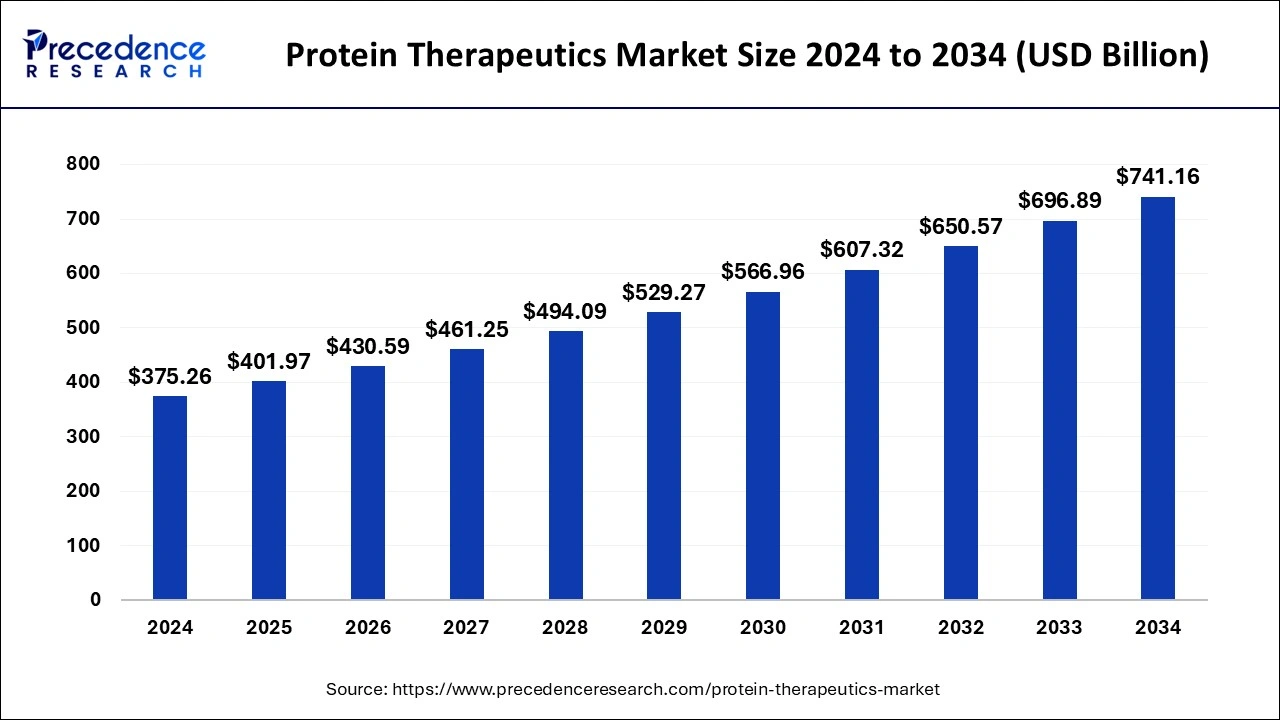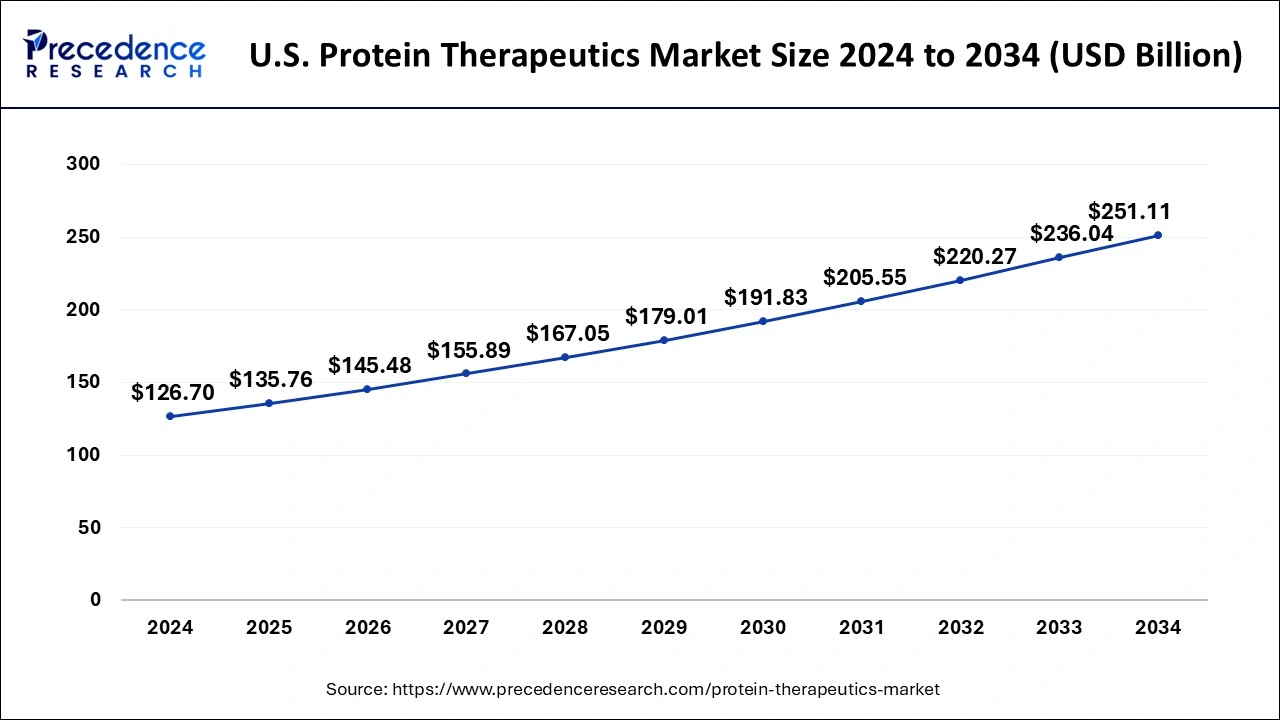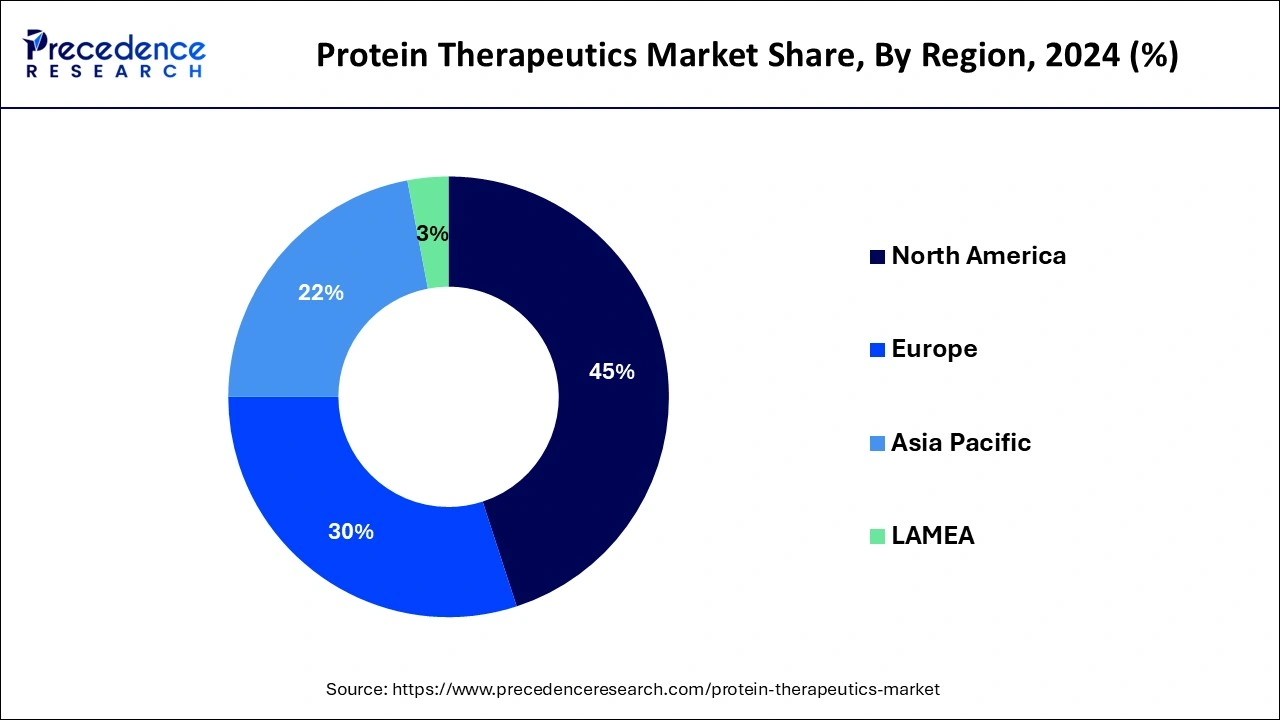November 2024
The global protein therapeutics market size is calculated at USD 401.97 billion in 2025 and is forecasted to reach around USD 741.16 billion by 2034, accelerating at a CAGR of 7.04% from 2025 to 2034. The North America protein therapeutics market size surpassed USD 168.87 billion in 2024 and is expanding at a CAGR of 7.06% during the forecast period. The market sizing and forecasts are revenue-based (USD Million/Billion), with 2024 as the base year.
The global protein therapeutics market size was estimated at USD 375.26 billion in 2024 and is predicted to increase from USD 401.97 billion in 2025 to approximately USD 741.16 billion by 2034, expanding at a CAGR of 7.04% from 2025 to 2034. The increasing cases of chronic disease and the advancements in biotechnology are driving the growth of the protein therapeutics market.

The U.S. protein therapeutics market was valued at USD 126.7 billion in 2024 and is expected to reach USD 251.11 billion by 2034, growing at a CAGR of 7.08% from 2025 to 2034.

North America led the global market with the highest market share of 45% in 2024. The dominance of the region's market is attributed to the presence of the established healthcare industry and the ongoing development in the launch and innovations of medicines and treatments, which are driving the growth of the market. The rising presence of major healthcare institutions and pharmaceutical firms, research centers, and skilled working professions are contributing to the expansion of the market.

The region has a high prevalence of chronic diseases such as cancer, diabetes, autoimmune disorders, and cardiovascular diseases. Protein therapeutics offer targeted treatment options for these conditions, driving demand for innovative biological drugs that can effectively manage symptoms and improve patient outcomes. North America is home to many leading pharmaceutical companies, biotechnology firms, research institutions, and academic centers focused on protein therapeutics research and development. These organizations collaborate closely with healthcare providers, regulatory agencies, and patient advocacy groups to accelerate the translation of scientific discoveries into clinically viable therapies.
Asia Pacific is expected to witness the fastest growth in the protein therapeutics market during the forecast period. The growth of the market is attributed to the rising geriatric population in countries like China and India, and the increasing ratio of chronic diseases is fueling the growth of the market in the region. The rising investments in R&D in the innovation of the latest treatment and formulation of drugs for the treatment of chronic diseases are contributing to the growth of the protein therapeutics market over the forecast period.
Rising healthcare expenditure and investment in healthcare infrastructure across countries in the Asia Pacific region are driving demand for advanced therapeutic treatments, including protein therapeutics. As economies in the region continue to grow, governments and private sectors are allocating more resources to healthcare, leading to increased access to and adoption of protein-based drugs.
Technological advancements in biotechnology, including recombinant DNA technology, protein engineering, and cell culture techniques, are facilitating the development of novel protein therapeutics with enhanced efficacy, specificity, and safety profiles. Academic institutions, research organizations, and biotechnology companies in the Asia Pacific region are actively engaged in research and development activities to discover and develop new protein-based drugs, driving innovation and growth in the market.
The protein therapeutics market offers and revolves around the businesses associated with recombinantly modified human proteins known as therapeutic proteins. Scientists can examine the properties of proteins by using various representations of their complex structure. Treating HIV, cancer, and other illnesses with therapeutic proteins is a frequent practice. We now provide an overview of medicinal proteins' uses and functional characteristics. Increased prevalence of long-term illnesses such as diabetes, cancer, and autoimmune disorders is driving the need for novel treatment solutions. The expansion of protein therapies' applications and enhancement of treatment outcomes, as a result of ongoing research and development activities, are driving the growth of the global protein therapeutics market.
| Report Coverage | Details |
| Market Size by 2034 | USD 741.16 Billion |
| Market Size in 2024 | USD 375.26 Billion |
| Market Size in 2025 | USD 401.97 Billion |
| Market Growth Rate from 2024 to 2034 | CAGR of 7.04% |
| Largest Market | North America |
| Base Year | 2024 |
| Forecast Period | 2024 to 2034 |
| Segments Covered | Product, Application, and Regions |
| Regions Covered | North America, Europe, Asia-Pacific, Latin America, and Middle East & Africa |
Rising rate of chronic disease
The increasing number of chronic diseases among the population, especially in the geriatric population, is driving the growth of the protein therapeutics market. Chronic diseases include diseases, cancer, and other neurological diseases among the population, driving the demand for protein therapeutics treatment. Rising cases of type 1 and type 2 diabetic patients and the steady rise in cancer patients all around the world are accelerating the demand for the market. Additionally, the rising demand for personalized medicines customized according to the genetic profile of the patient, the disease, and the response to the treatment accelerates the growth of the market.
High cost
The formulation and development of protein drugs involve complex procedures and require extensive research and development, which results in increased expenditure. Thus, the increased cost of the development of drugs is restraining the growth of the protein therapeutics market.
R&D and rising investment
Continuous research and development for refining protein increase the applications and patient outcomes in the protein therapeutics market. The rising investment by the major market players for the development of the next-generation monoclonal antibodies, protein-based modalities, and bispecific antibodies, and the rising investments in increasing cases of chronic disease, are contributing to the growth of the protein therapeutics market.
The monoclonal antibodies segment dominated the protein therapeutics market in 2024. The dominance of the segment is attributed to the rising use of monoclonal antibodies in the treatment of various chronic diseases, which is driving the growth of the segment in the market. Monoclonal antibodies are used in the treatment of rheumatoid arthritis, cancers, systemic lupus erythematosus, multiple sclerosis, Crohn’s disease, cardiovascular diseases, psoriasis, ulcerative colitis, and rejections associated with transplantation.
They are majorly used in laboratory techniques studies, therapies, and research for the medication and treatment for infections and other disorders. The monoclonal antibodies are widely used in the treatment of several types of cancer. Thus, the increasing demand from the research center and the treatment of chronic disease is accelerating the demand for the segment in the market.
The insulin segment is expected to grow in the protein therapeutics market during the forecast period. The increasing number of diabetic cases all across the world is driving the demand for the insulin segment in the market. Insulin is the hormone that is naturally produced by the body the main role of insulin is to enable the cells in the body to increase glucose and convert it as a form of energy. In diabetic patients, there is no natural insulin is released, so they need to take insulin from the medication. Insulin is mostly taken by people affected by type 1 diabetes. Insulin is available as synthetic human insulin, insulin analog, and biosimilars. The increasing number of cases of diabetes patients is fueling the growth of the segment in the market.
The metabolic disorders segment dominated the protein therapeutics market in 2024. The rising cases of metabolism disorders such as Gaucher's disease, diabetes, and hemochromatosis are driving the demand for the protein therapeutics market. Metabolic disorders have some common symptoms like weight loss or gain, tiredness, vomiting, and nausea. Metabolic disorders generally occur when the chemical reaction disturbs the metabolism of the body. Metabolic disorders have various treatment options depending upon the cause of the disorders. The rising cases of metabolic disorders due to genetics, bad eating habits, and lifestyle changes contribute to the growth of the market.
Immunological disorders are substantially growing in the market during the forecast period. In immunological disorders, the body's immune system doesn't work properly the way it should work. There are certain types of immunological disorders, such as severe combined immunodeficiency (SCID) disorders, that come with the birth of a child and temporary acquired immune deficiencies. These types of immunodeficiencies come after the severe treatment of diseases like chemotherapy treatment for cancer and AIDS destroys the important white blood cells and weakens the immune system. The rising number of such is accelerating the demand for the market.
By Product
By Applications
By Geography
For inquiries regarding discounts, bulk purchases, or customization requests, please contact us at sales@precedenceresearch.com
No cookie-cutter, only authentic analysis – take the 1st step to become a Precedence Research client
November 2024
September 2024
November 2024
August 2024